- Home
- Jane Peart
Destiny's Bride
Destiny's Bride Read online
ZONDERVAN
Destiny's Bride
Copyright © 1991, 1988 by Jane Peart
All rights reserved under International and Pan-American Copyright Conventions. By payment of the required fees, you have been granted the non-exclusive, non-transferable right to access and read the text of this e-book on-screen. No part of this text may be reproduced, transmitted, down-loaded, decompiled, reverse engineered, or stored in or introduced into any information storage and retrieval system, in any form or by any means, whether electronic or mechanical, now known or hereinafter invented, without the express written permission of Zondervan.
ePub Edition July 2009 ISBN:978-0-310-83008-5
Requests for information should be addressed to:
Zondervan Publishing House
Grand Rapids, Michigan 49530
Library of Congress Cataloging-in-Publication Data:
Peart, Jane.
Destiny's Bride / Jane Peart.
p. cm.
ISBN 0-310-67021-7
I. Title. II. Series: Peart, Jane. Brides of Montclair series :
bk. 8.
PS3566.E238D47 1991
813'.54—dc20
91-12085
CIP
Scripture quotations are taken from the King James Version of the Holy Bible.
All rights reserved. No part of this publication may be reproduced, stored in a retrieval system, or transmitted in any form or by any means—electronic, mechanical, photocopy, recording, or any other—except for brief quotations in printed reviews, without the prior permission of the publisher.
Edited by Anne Severance
Cover Design by Art Jacobs
95 / LP / 10 9 8 7 6 5 4
Contents
Cover Page
Title Page
Copyright
Part I
chapter 1
chapter 2
chapter 3
chapter 4
chapter 5
chapter 6
chapter 7
chapter 8
chapter 9
chapter 10
Part II
chapter 11
chapter 12
chapter 13
chapter 14
chapter 15
Part III
chapter 16
chapter 17
chapter 18
chapter 19
chapter 20
chapter 21
chapter 22
chapter 23
chapter 24
chapter 25
Epilogue
Family Tree
About the Author
About the Publisher
Share Your Thoughts
For my sisters,
Ruth and Audrey,
who shared my childhood—the love, laughter,
tears, and triumphs!
Part I
September 1882
chapter
1
"DRU! DRUSCILLA !" My mother's voice startled me awake. She was bending over me, her expression so distressed that I felt a pang of alarm.
I raised myself on my elbows, rubbing the sleep from my eyes. "What is it, Mama?"
"Oh, my dear, we have just had the most dreadful news. Alair is dead!" Her wide dark eyes grew suddenly bright with tears.
Fully awake now, I sat up. "Dead! Alair? But how?" My cousin was only twenty-six, just six years older than I, and in the prime of radiant young womanhood.
"We don't know all the details. We just got word. Some kind of accident." She began turning back the bedcovers. "You must get up at once. There really is no time to lose, Dru. We must leave for Mayfield as soon as possible. Garnet will send a carriage to meet us at the station."
Mama's hands shook as she handed me a cup of coffee to drink while I tried to absorb this shattering news.
"I must arrange for Auntie Nell's care while we are gone. Poor soul, she's quite distraught, but at her age the train trip and funeral would be too much. Now, hurry, dear! I've sent Bessie to the train station to see when the next train is leaving, and we must be on it!"
My mother left the room, and I got shakily to my feet. I couldn't seem to gather my wits. All that had registered was the stunning announcement that my cousin was dead!
I glanced at my open trunk, half-packed, standing in the corner. I was to leave for my new teaching post at Thorny-croft School in Massachusetts at the end of the week. Dazedly I moved toward it. Had I packed anything that would be suitable for a funeral?
Funeral! Alair's funeral. The unreality of it rolled over me in a fresh wave of grief, and I was wrenched back eight years to a happier day. I could hear Alair's voice.
"But of course, Druscilla's going to be in my wedding! She will wear the loveliest dress of pink ruffled lawn with a pink satin sash, and carry pink roses. It will be perfect with her dark hair and beautiful eyes. Oh, Aunt Dove, you can't say no!"
If there had been any doubt in Mama's mind that I should be one of Alair's bridal attendants, it vanished in that moment. No one had ever been able to deny Alair anything she was set on having. I never quite understood why.
Even at age twelve I knew that Alair's engagement to Randall Bondurant had caused a flurry of controversy throughout our plantation community. There had been strong feelings as to whether or not any of our family should even attend the wedding, much less participate in it.
I remember the buzz of speculation among the older family members when the announcement came.
"Not suitable at all!"
"Well, he is from an old Charleston family— "
"But disowned, I'm told."
"Something about a duel?"
"No, but he was expelled from the Citadel—"
"Some boyish prank, I suppose?"
"Gambling, my dear!"
Shocked gasps all around.
"Besides, he's ten years older—"
"And as rich as Croesus." The last was uttered with a certain respect.
"What do Harmony and Clinton say?"
"What can they say? They've always spoiled the girl outrageously."
"Yes, she is willful and headstrong."
"But what can a young lady do in these times, these circumstances?"
Again a round of heavy sighing.
"The truth and pity of it is that so many of our gallant young men perished in the war."
"The war!" There was a consensus of nods. Then someone had said, "Well, at least, she will live at Montclair."
"Bon-Chance" corrected another.
"Good Luck, indeed?" was the final cryptic comment.
I knew that the reason for all the debate was an old family scandal, one that was spoken of in whispers although it was an open secret in Mayfield.
Randall Bondurant now lived on the estate that had been Montrose property for generations, ever since it was built on an original King's Grant in the 1700s, until it was lost to Bondurant in a card game by my Uncle Malcolm.
I had grown up at Montclair with my cousins—Alair Chance and Jonathan Montrose—and our mothers, who decided to move in together for the sake of safety and joint strength while our fathers were off fighting in the war. So, of course, I was pleased when Bondurant restored the house and gardens to their antebellum splendor and was thrilled to learn that the wedding would be held there.
Certainly, Alair was beside herself with excitement, and even the name change didn't concern her in the least.
"I think it's absolutely the most romantic thing a man ever did!" she trilled as we were being fitted for our dresses. "To combine my last name and his for our new home! Oh, we shall be so happy. I know it! What's more—" She dimpled and winked in a conspiratorial manner—"I think I deserve some credit for getting the place back into the family . . . no
matter what it's called!" And she tossed her beautiful head in the careless way she had.
At that point I didn't care what our relatives said, either. I thought Randall Bondurant was dashing and handsome, and Alair the luckiest girl in the world.
I adored Alair—always had—ever since those days at Montclair when she had so often declared herself the leader of our trio, teasing Jonathan and me if we lagged behind in any of her reckless games—climbing trees, wading in the creek, playing in the woods. If she were our self-appointed "queen," the two of us were her willing subjects. And on the few occasions when we dared to question her leadership, she said she should lead because she was the oldest. Actually, it was because she knew how to charm and manipulate to get her way even then, and we gladly agreed just for the privilege of playing with her.
Lost in my memories of those carefree days, I was still standing in my nightgown, my cup of untasted coffee in my hand, when Mama came back into the bedroom.
"Not dressed yet? Darling, do hurry. Our train leaves at one. Shall I help?"
"No, thank you, Mama, I'll manage. It's just that somehow I can't believe it yet—that Alair is really dead."
"I know, darling." Mama took the cup from me and set it down, then hugged me. "I understand just how you feel."
And I knew she did. Tragedy was no stranger to her. Loss, loneliness, poverty had been her lot. Raised in wealth, destined for a life of luxury and leisure, she had been widowed at twenty, her father's fortune wiped out. With a child to support, Dove Arundell Montrose had no choice but to survive.
She had taught school, worked as a seamstress, and now lived with our elderly relative, Nell Perry, as the old woman's housekeeper-companion. As I looked into my mother's once-beautiful face, it seemed even lovelier to me than the pictures of her, painted when she was younger. Now there was an inner beauty shining through, the kind that only strength, courage, and compassion can give.
"Now, dear, we really must hurry." She gave me another hug and left me to make my hasty preparations for the trip.
Although it was only early September, the day was overcast and a chill, sharp wind tugged at our skirts and whipped our bonnet strings as we followed the flower-banked casket up to the hilltop Montrose family graveyard above the house once known as Montclair.
Standing at Alair's gravesite in the Montrose family hilltop cemetery, I couldn't help thinking of the irony. The last time all the family had gathered was at her wedding eight years earlier. Death seemed much more cruel to have taken one so young and beautiful.
I looked at Alair's husband across the yawning chasm of the grave. Randall's head was bowed, his broad shoulders slumped. The two little girls stood on either side of him, holding his hands.
Alair's children, I thought, feeling my throat tighten. With their long, fair hair and delicate features, they looked remarkably like her as a child. But the eyes—oh, the eyes were Bondurants'—large and dark, now filled with an expression of bewildered sadness. At seven and five, these little ones had no idea of the enormity of their loss.
Because Randall and Alair had traveled a great deal and because of our circumstances, I saw my cousin only rarely after her marriage. At first she appeared unexpectedly at Montclair, fashionably dressed, and bringing gifts and her own unique brand of joie de vivre that evoked so many fond remembrances. But not recently. None of us had seen Alair in nearly two years.
My eyes traveled around the group of mourners. Beside my mother stood Aunt Garnet, elegant in a black faille suit and wearing a stylish bonnet that did not completely hide her still glorious red-gold hair.
She had known her share of sorrow, even though she was now married to a wealthy publisher and kept houses in both New York and London. She had buried her first hero-husband—my Uncle Bryce—in this same cemetery, and surely must be thinking of him today.
Next to Garnet was her mother, Kate Cameron—tall, regal, still beautiful in her sixties. I could detect few scars of the long hard years of struggle. I felt a rush of warmth. This woman had been like a grandmother to me. After the war Kate had opened in her home an exclusive school for young ladies and asked Mama to be one of the teachers. So we moved to Cameron Hall, where I had been able to receive the same fine education and cultural advantages that the daughters of the nouveau riche Yankee families had to pay for mightily.
Then my eyes rested on the small, dignified figure of my mother with her cameo features and silver hair. I saw the sympathy on her face as she looked at Randall, and I followed her glance.
At that very moment he lifted his head, and I saw his eyes like two burning coals in his ravaged face. For a few seconds our gazes locked, and I saw the raw grief there. I drew in my breath. Then I saw something in his expression that frightened me—and I turned quickly away.
At last the service was over and the line of mourners filed through the black iron-lace gate of the cemetery fence, winding through velvety, manicured lawns back toward the mansion. I could not help thinking that these had been the untended meadows where Jonathan, Alair, and I had once romped and played.
By the time we arrived at the house, Bondurant and the children had disappeared up the steps. I swallowed my disappointment. I had so wanted to get a closer look at those forlorn little girls, perhaps offer them some comfort.
"Please try to understand. The man's brokenhearted." Uncle Clinton tried to explain. "It happened so suddenly that none of us—" He cleared his throat. "But you will come to our house, won't you? Harmony needs—" His voice trailed away as he looked toward his heavily veiled wife who, supported by her maid, was being handed into their carriage.
"Of course, we understand, Clint," Garnet hushed him with a restraining hand on his arm. "We'll be along presently."
Once in her carriage on the way to the Chance home, however, she raised an eyebrow. "You would think Randall Bondurant might have stayed long enough to accept our condolences—"
"You heard Clinton, Garnet. He said Randall was too depressed to speak to anyone," Kate put in mildly.
"Yes, but we're family, after all."
"Well, we really have not been much family to him, my dear. None of us ever really accepted him," Kate reminded her. "Nor received him, for that matter."
Since the truth could not be disputed, no further comments were made.
As we rounded the bend of the drive leaving Montclair, I turned to look back. I would have loved to have gone inside and walk through the house I had known so well as a child—a house where I had been very happy. I wondered if Alair had been happy there.
As I was taking that last lingering look, a sudden brisk wind sent a scatter of golden leaves spinning from the elm trees that lined the drive. I shivered. It seemed the symbol of the end of a golden era of my life. I felt I would never see my childhood home again.
chapter
2
THE HOUSE Randall Bondurant had presented his new in-laws upon his marriage to their daughter was impressive. I was more than a little awed by its grandeur as we went inside.
While growing up, I had never thought of myself as poor. Of course, we were living at Cameron Hall then, and its gracious rooms were refurbished over a period of time. But all around were reminders that the South had been left impoverished in the aftermath of the war. Everyone we knew, including most of our immediate family, had lost everything—not only their menfolk but their homes and wealth.
Certainly Uncle Clinton and Aunt Harmony had been similarly affected. It wasn't until Alair became engaged to Randall Bondurant that their fortunes changed dramatically.
We were shown into the elegant parlor by a uniformed black butler, and I looked around with undisguised amazement. Gold-flocked wallpaper, velvet draperies, and handsomely carved furniture met my wide-eyed gaze. Over the white marble mantelpiece hung a portrait of Alair that momentarily unnerved me. She looked so alive, smiling that secret smile, head held high, eyes sparkling.
Aunt Garnet's voice, tinged with slight sarcasm, snapped me back to the present. "We
ll, it appears that Harmony and Clint will never want for anything!"
"Yes, and isn't it a blessing, not to have the burden of poverty added to the loss of their only child?"
At Mama's gentle rebuke, Garnet flushed. "Well, of course, money never eased sorrow, but lack of it does cause its own kind of grief. Think of Blythe," she said with a significant inflection.
There was no reply as everyone in the room remembered Uncle Malcolm's widow who had disappeared so mysteriously after Montclair was lost to Bondurant.
Just then Uncle Clinton joined us, followed by the butler bearing a large silver tray with a tea set.
"Harmony isn't quite herself yet," he apologized. "Perhaps later." He wiped his forehead with his handkerchief. "I don't think she'll . . . either of us . . . can ever get over this—"
I heard only fragments of the conversation after that—my mother and aunts offering their words of comfort—Uncle Clint telling his story of the accident that had cost the life of his adored daughter—the sympathetic responses.
"Her horse was frightened by something, reared—she was thrown—"
"But Alair was an expert horsewoman."
"Unbelievable!"
"Was she alone?"
"Her horse came back with an empty saddle—"
"That beautiful girl—"
"With her whole life ahead of her—"
The last two comments rang a bell. I had heard almost those identical words on Alair's wedding day. Everyone had declared there had never been a more radiant bride. I remembered, too, the look of adoration in Randall's eyes as he watched Alair moving to meet him in the gazebo he had especially built for the wedding. At the time, I had dreamily wondered if any man would ever look at me like that.
My gaze was drawn once more to the painting of my beautiful cousin. It must have been painted soon after her engagement was announced, for the artist had posed her left hand holding a furled fan to display the large diamond solitaire ring Randall had given her.
I recognized the dress of coral silk with a Spanish flounce of delicate ruffled lace, part of her trousseau, because she had shown off both the dress and her ring to me the same day.
"See, Druscilla," she had said, extending her finger where the diamond sparkled at me. "Look at this! Some day a handsome prince will come along for you, too, and shower you with jewels and carriages and fine clothes."

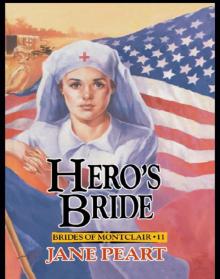 Hero's Bride
Hero's Bride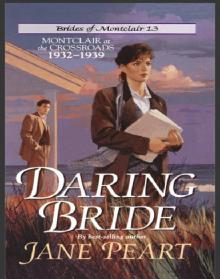 Daring Bride
Daring Bride Runaway Heart
Runaway Heart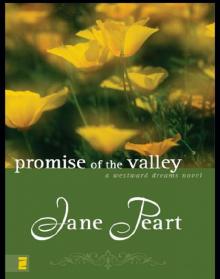 Promise of the Valley
Promise of the Valley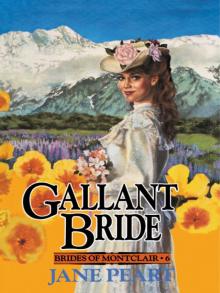 Gallant Bride
Gallant Bride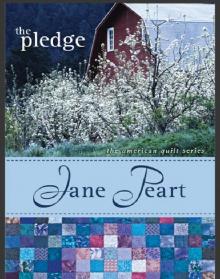 The Pledge, Value
The Pledge, Value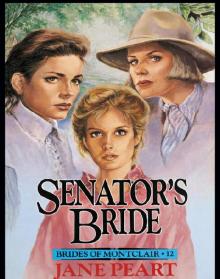 Senator's Bride
Senator's Bride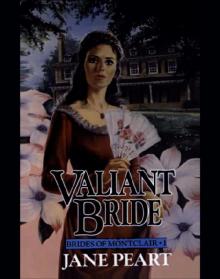 Valiant Bride
Valiant Bride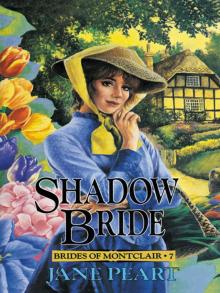 Shadow Bride
Shadow Bride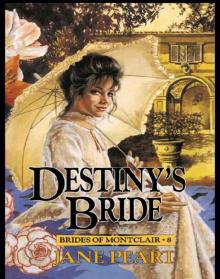 Destiny's Bride
Destiny's Bride A Tangled Web
A Tangled Web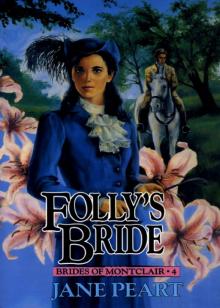 Folly's Bride
Folly's Bride The Promise
The Promise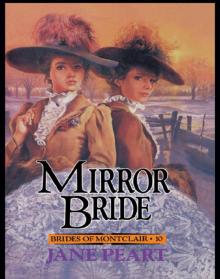 Mirror Bride
Mirror Bride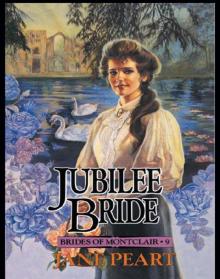 Jubilee Bride
Jubilee Bride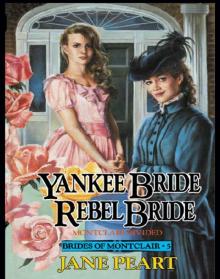 Yankee Bride / Rebel Bride
Yankee Bride / Rebel Bride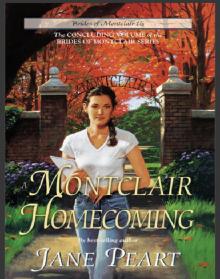 A Montclair Homecoming
A Montclair Homecoming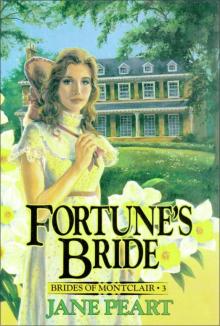 Fortune's Bride
Fortune's Bride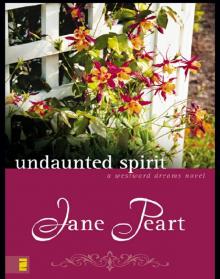 Undaunted Spirit
Undaunted Spirit Love Takes Flight
Love Takes Flight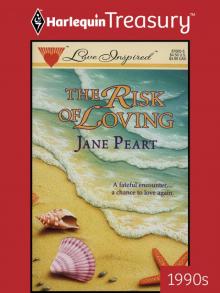 The Risk of Loving
The Risk of Loving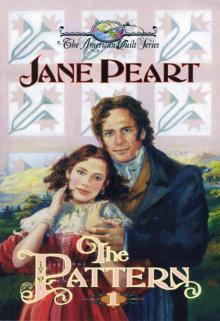 The Pattern
The Pattern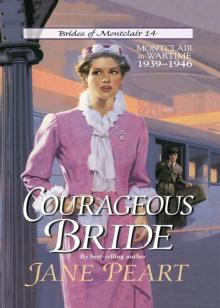 Courageous Bride
Courageous Bride